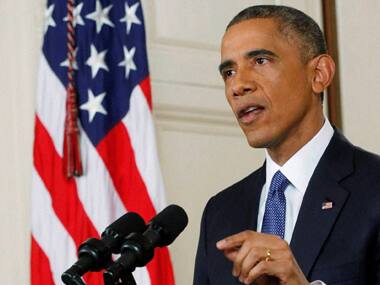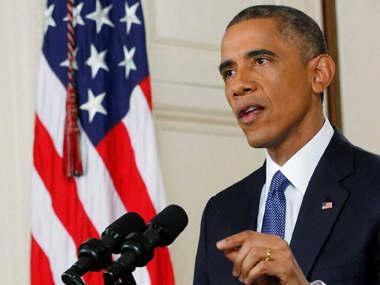Kuala Lumpur: The Obama administration is asking the Supreme Court for a speedy decision on its plans to shield from deportation and give work permits to millions of immigrants living in the US illegally. [caption id=“attachment_2509530” align=“alignleft” width=“380”]  Barack Obama. PTI[/caption] Legal papers filed on Friday call for the court’s immediate review of President Barack Obama’s plan to protect as many as 5 million immigrants. The immigrants affected are mainly the parents of American citizens and lawful permanent residents. The appeal, filed a year after Obama announced his executive actions on immigration, injects the Supreme Court into a dispute between 26 mainly Republican-led states and the Democratic administration, amid a presidential race in which immigration has been a flashpoint. If the court agrees to hear and decide the case by late June, and if the justices side with the administration, that would leave roughly seven months in Obama’s presidency to implement his plans. But time is running short for consideration of the immigration issue in the court’s current term. Texas, the lead state in the lawsuit, has 30 days to respond, but could ask for more time. If the justices don’t agree by mid-January to hear the case, the issue probably will not be decided until after Obama leaves office in January 2017. At issue is the Deferred Action for Parents of Americans program, which Obama said would allow people who have been in the United States more than five years and who have children who are in the country legally to “come out of the shadows and get right with the law.” Texas quickly led a legal challenge to the program, and has won every round in court so far, effectively blocking Obama’s plans. Most recently, the 5th U.S. Circuit Court of Appeals ruled in favor of the states. The administration makes three main arguments in its Supreme Court appeal: the states have no right to challenge the policy in federal court; the government followed appropriate procedure and the administration has broad discretion in the area of immigration. Rebuffed over refugees, shifts focus to visas Regrouping from an embarrassing defeat in the House, the White House tried to change the subject away from its Syrian refugee program on Friday, instead calling for changes that could prohibit some people from bypassing the traditional visa system to enter the American homeland. A day after the House overwhelmingly backed onerous hurdles for Syrian refugees, White House officials said President Barack Obama’s intention to veto the bill hadn’t wavered, even though it passed with a veto-proof majority — including 47 members of his own party. Although the strong House vote could improve the bill’s prospects in the Senate, the White House insisted it was unlikely to arrive on the president’s desk. Instead, the White House said it wanted to work with Congress on potential tweaks to the visa waiver program, calling it a “fruitful area for possible bipartisan discussion.” Under the program, foreigners from 38 countries can enter the U.S. without visas for short stays. Press secretary Josh Earnest said talks were already underway with Sen. Dianne Feinstein, a Democrat, and Sen. Jeff Flake, a Republican. “This is an area where additional screenings and reforms could be useful in enhancing the national security of the United States,” Earnest told reporters aboard Air Force One as Obama flew to Malaysia. Feinstein and Flake hope to force anyone who has been in Iraq or Syria in the past five years to go through the traditional visa process, including an in-person interview, fingerprinting and tamper-proof passport security. Feinstein has said she plans to introduce the bill after Thanksgiving, calling the visa waiver program “the soft underbelly of our national security policies.” The White House wouldn’t say whether Obama supports her proposal in its current form or what other options were under consideration. Obama’s newfound focus on visa changes marked an effort to subdue momentum for the refugee bill following the White House’s failed lobbying effort in the House. Some Democrats briefed on the refugee screening process by Obama’s chief of staff and Homeland Security secretary emerged far from impressed, leading to Thursday’s 289-137 vote to undermine the president’s program. Obama has called for accepting roughly 10,000 Syrian refugees in the next year. But that program has been plunged into uncertainty following the Paris attacks that killed 129 and stoked deep fears across the West about terrorism being exported from Syria, where the long-raging civil war has fueled the Islamic Stage group’s rise. Defenders of the House bill, including some Democrats, have described its changes as fairly modest: mandatory FBI background checks and individual sign-offs by top U.S. officials. But the White House has insisted it’s wholly unnecessary, arguing that Syrians intent on committing terrorism on U.S. soil are unlikely to subject themselves to a refugee process that involves rigorous security checks and takes two years on average to complete. Yet some top officials, including FBI Director James Comey, have warned of a shortage of information about many Syrians applying for refugee status. Ben Rhodes, Obama’s deputy national security adviser, conceded that was the case, but said Friday that the U.S. does have intelligence on the Syrians most likely to carry out violence. “A Syrian child is not going to have an intel record, but precisely for that reason, we believe that this is not the pool of individuals who are most likely to be ISIL operatives,” Rhodes said, using an acronym for the Islamic State group. “That’s not a reason not to allow them into the country.” The roiling debate about what to do with the flood of migrants fleeing Syria’s civil war has played out this week as Obama traveled from Turkey to the Philippines and Malaysia for a trio of global summits. Obama has rebuked Republican politicians and presidential candidates who have called for halting refugee entry or limiting it to Syrian Christians, but the White House has acknowledged that some governors and American citizens hold legitimate concerns. AP
Regrouping from an embarrassing defeat in the House, the White House tried to change the subject away from its Syrian refugee program on Friday, instead calling for changes that could prohibit some people from bypassing the traditional visa system to enter the American homeland.
Advertisement
End of Article
Written by FP Archives
see more


)

)
)
)
)
)
)
)
)



